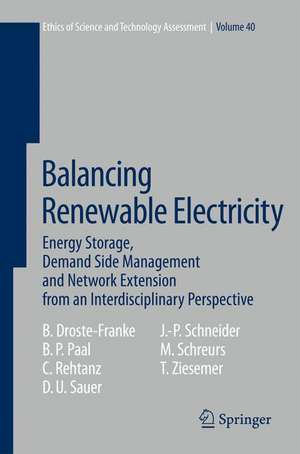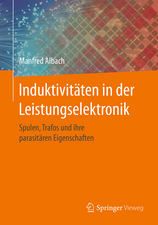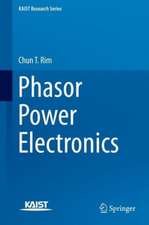Balancing Renewable Electricity: Energy Storage, Demand Side Management, and Network Extension from an Interdisciplinary Perspective: Ethics of Science and Technology Assessment, cartea 40
Autor Bert Droste-Franke, Boris P. Paal, Christian Rehtanz, Dirk Uwe Sauer, Jens-Peter Schneider, Miranda Schreurs, Thomas Ziesemeren Limba Engleză Hardback – 2 feb 2012
The study introduces technologies that can balance electricity in energy systems and that can serve as enabling technologies for the integration of large quantities of renewable energies in the power supply system. It begins with a discussion of normativeaims for the future electricity system before continuing with a description of current policies and political developments and an overview of relevant existing energy system studies. These sections serve as background for the remainder of the study. They are followed by discussion and analysis of the growing demand for means to balance the fluctuations found in electricity generated in power systems with a high penetration of renewable energies, the potentials of diverse technologies, requirements for electrical networks, economic impacts and important legal issues. Finally, the main challenges to the achievement of developing balancing technologies and processes for renewable electricity-dominant systems are summarised and recommendations made.
| Toate formatele și edițiile | Preț | Express |
|---|---|---|
| Paperback (1) | 640.71 lei 6-8 săpt. | |
| Springer Berlin, Heidelberg – 23 feb 2014 | 640.71 lei 6-8 săpt. | |
| Hardback (1) | 644.82 lei 6-8 săpt. | |
| Springer Berlin, Heidelberg – 2 feb 2012 | 644.82 lei 6-8 săpt. |
Din seria Ethics of Science and Technology Assessment
- 15%
 Preț: 439.70 lei
Preț: 439.70 lei - 18%
 Preț: 796.13 lei
Preț: 796.13 lei -
 Preț: 392.21 lei
Preț: 392.21 lei -
 Preț: 350.12 lei
Preț: 350.12 lei - 5%
 Preț: 368.00 lei
Preț: 368.00 lei - 20%
 Preț: 709.13 lei
Preț: 709.13 lei -
 Preț: 386.22 lei
Preț: 386.22 lei - 15%
 Preț: 714.02 lei
Preț: 714.02 lei -
 Preț: 478.05 lei
Preț: 478.05 lei -
 Preț: 489.30 lei
Preț: 489.30 lei -
 Preț: 389.70 lei
Preț: 389.70 lei - 15%
 Preț: 469.91 lei
Preț: 469.91 lei - 15%
 Preț: 643.00 lei
Preț: 643.00 lei -
 Preț: 402.98 lei
Preț: 402.98 lei -
 Preț: 393.90 lei
Preț: 393.90 lei -
 Preț: 407.19 lei
Preț: 407.19 lei -
 Preț: 384.86 lei
Preț: 384.86 lei -
 Preț: 386.61 lei
Preț: 386.61 lei -
 Preț: 402.38 lei
Preț: 402.38 lei - 15%
 Preț: 657.73 lei
Preț: 657.73 lei - 18%
 Preț: 747.20 lei
Preț: 747.20 lei - 5%
 Preț: 737.69 lei
Preț: 737.69 lei - 15%
 Preț: 449.83 lei
Preț: 449.83 lei -
 Preț: 384.86 lei
Preț: 384.86 lei - 15%
 Preț: 504.99 lei
Preț: 504.99 lei - 5%
 Preț: 366.70 lei
Preț: 366.70 lei - 5%
 Preț: 724.50 lei
Preț: 724.50 lei - 18%
 Preț: 740.11 lei
Preț: 740.11 lei - 15%
 Preț: 473.49 lei
Preț: 473.49 lei -
 Preț: 405.06 lei
Preț: 405.06 lei
Preț: 644.82 lei
Preț vechi: 758.60 lei
-15% Nou
Puncte Express: 967
Preț estimativ în valută:
123.38€ • 129.17$ • 102.09£
123.38€ • 129.17$ • 102.09£
Carte tipărită la comandă
Livrare economică 05-19 aprilie
Preluare comenzi: 021 569.72.76
Specificații
ISBN-13: 9783642251566
ISBN-10: 3642251560
Pagini: 300
Ilustrații: XLVIII, 256 p.
Dimensiuni: 155 x 235 x 22 mm
Greutate: 0.54 kg
Ediția:2012
Editura: Springer Berlin, Heidelberg
Colecția Springer
Seria Ethics of Science and Technology Assessment
Locul publicării:Berlin, Heidelberg, Germany
ISBN-10: 3642251560
Pagini: 300
Ilustrații: XLVIII, 256 p.
Dimensiuni: 155 x 235 x 22 mm
Greutate: 0.54 kg
Ediția:2012
Editura: Springer Berlin, Heidelberg
Colecția Springer
Seria Ethics of Science and Technology Assessment
Locul publicării:Berlin, Heidelberg, Germany
Public țintă
ResearchCuprins
Future Perspectives of Electrical Energy Supply.- Existing Energy System Studies.- Demand for Balancing Electrical Energy and Power.- Technologies for Balancing Electrical Energy and Power.- Technology of Electricity Networks, Economical Impacts and Policy.- Legal Analysis of Balancing Strategies.- Analysis of Economic Impacts.- Conclusions and Recommendations.
Textul de pe ultima copertă
A significant problem of integrating renewable energies into the electricity system is the temporally fluctuating energy production by wind and solar power plants. Thus, in order to meet the ambitious long-term targets on CO2 emission reduction, long-term viable low-carbon options for balancing electricity will be needed.
This interdisciplinary study analyses published future energy scenarios in order to get an impression of the required balancing capacities and shows which framework conditions should be modified to support their realisation. The authors combine their perspectives from energy engineering, technology assessment, political science, economical science and jurisprudence and address science, politics, actors in the energy sector and the interested public.
Respectively, requirements for the balancing systems are analysed, considering the case of Germany as a large country with high ambitions to reduce greenhouse gas emissions. Additionally, an approach to investigate the optimal design of the technical system for balancing electricity over Europe is sketched. Looking at the challenges of a future energy system a mix of complementary technologies will prospectively become prevalent. In order to foster the needed innovation processes adequately, several funding mechanisms and legal regulations should be adapted. The authors give recommendations to handle major challenges in the development of the technical infrastructure, for the design of market conditions and for specific support of the application of balancing technologies.
This interdisciplinary study analyses published future energy scenarios in order to get an impression of the required balancing capacities and shows which framework conditions should be modified to support their realisation. The authors combine their perspectives from energy engineering, technology assessment, political science, economical science and jurisprudence and address science, politics, actors in the energy sector and the interested public.
Respectively, requirements for the balancing systems are analysed, considering the case of Germany as a large country with high ambitions to reduce greenhouse gas emissions. Additionally, an approach to investigate the optimal design of the technical system for balancing electricity over Europe is sketched. Looking at the challenges of a future energy system a mix of complementary technologies will prospectively become prevalent. In order to foster the needed innovation processes adequately, several funding mechanisms and legal regulations should be adapted. The authors give recommendations to handle major challenges in the development of the technical infrastructure, for the design of market conditions and for specific support of the application of balancing technologies.
Caracteristici
Introduces technologies that can balance electricity in energy systems Describes current policies and political developments The main challenges for balancing technologies and processes within a system including renewable energies are summarised and recommendations made Includes supplementary material: sn.pub/extras


















